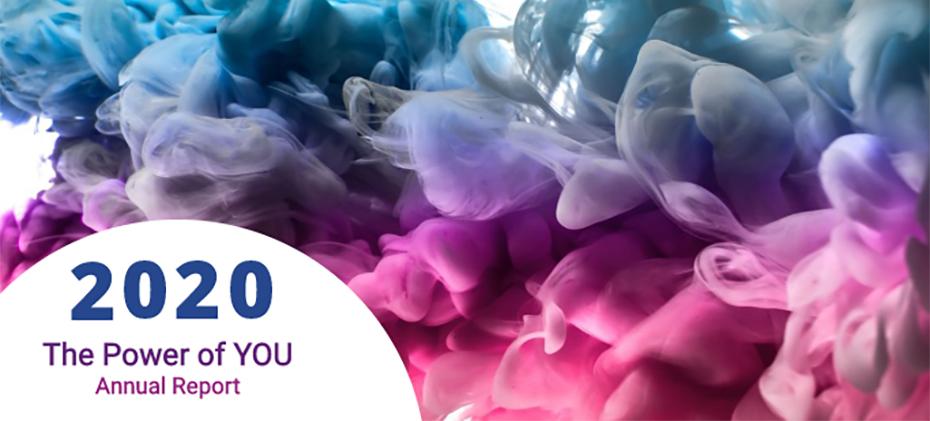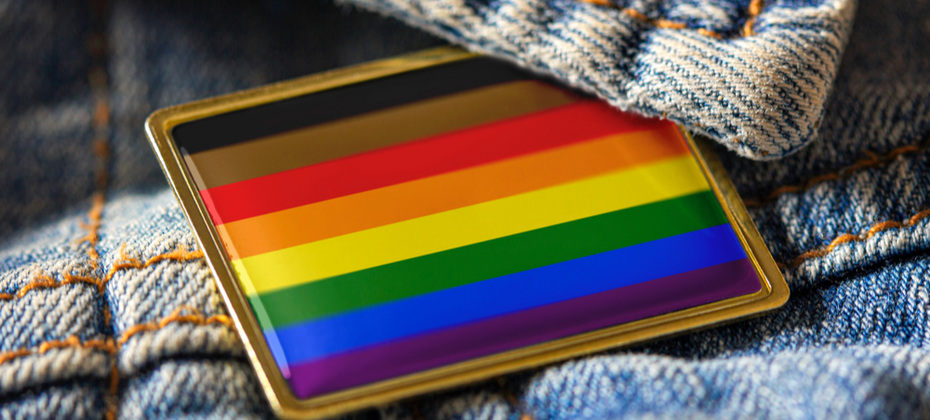Diversity & Inclusion
Experian champions diversity, equity, inclusion and belonging, and our deep commitment to social and financial inclusion is reflected in our workplace culture, our partnerships and our efforts to break down the barriers to financial equity. Read about our latest diversity and inclusion news below:

A year ago, we shifted our business to remote working as the global pandemic took hold. Like the rest of the world, we had no idea how long we’d be away, but we didn’t really imagine we’d still be operating our business with a remote workforce a year later. What a year it has been. It is incredible to look back and reflect on how our lives have changed, how we were able to adapt to this new way of living and working, and really importantly, how we were able to keep innovating to help communities and businesses during this difficult time. We have captured highlights of our work and efforts in our North America annual diversity and inclusion report, 2020 Power of YOU. At Experian, the safety and well-being of our colleagues has consistently been a top priority. As such, we have been able to focus on serving consumers and clients when and where they need help the most. As a company, we expanded our benefits to take care of our employees. Coworkers jumped in to take care of each other. Our employee resource group dedicated to mental health and caregiving partnered with colleagues to create a dynamic set of tools and guides tackling different topics every week through webinars, articles and personal, candid videos from leaders. We supported each other during times of social unrest. We celebrated progress in growing our business. We logged 18,000 volunteer hours to increase financial inclusion, support frontline healthcare workers, honor active duty military and veterans, and fight hunger in underprivileged communities. We leveraged our diversity of perspectives, backgrounds and experiences to help vulnerable populations in crisis from COVID-19, including launching our United for Financial Health program. We remain steadfast and committed to equity for all. We are proud to start the new year with this wonderful look back at last year, propelling us forward to more opportunities to innovate and serve. We invite you to check out the 2020 Power of YOU Report here.

A few weeks ago, we were able to share the exciting news about a new partnership we launched with the NAACP Empowerment Program. The Home Preservation Grant provides funding assistance to select Atlantans who are at risk of losing their homes because of a COVID-19-related hardship. It's part of Experian’s United for Financial Health program, which aims to empower and protect vulnerable consumers to improve their financial health through education and action. Today, we are excited to announce that 21 Atlanta-area homeowners are receiving grants for mortgage relief through this pilot program, just in time for the holidays. The recipients represent neighborhoods across Atlanta, including Christopher Heard, who serves our country in the Army National Guard Reserve and works in the airline industry. After Christopher’s employer cut his hours, he found it difficult to meet his mortgage payments on time. He told us, “We basically lost about 25 to 30% of our salaries across the board. COVID-19 was an unexpected curveball for everyone. This grant helps put me back on track, so I am grateful. I’d like to send a sincere thank you to the NAACP and Experian for their help.” Here’s a look at how the Home Preservation Grant is helping Christopher and other homeowners and communities in Atlanta. There are so many people like Christopher across Atlanta and in the U.S., who are struggling with their financial situation due to COVID-19. We believe that the Home Preservation Grant is such a meaningful program making a real difference in people’s lives and brings to life how Experian is promoting financial inclusion for all.

At Experian, our mission is to increase financial inclusion by empowering consumers. Through our corporate responsibility work, we have always been committed to using our resources to help more people improve their financial health through non-profit partnerships, data analytics, products and services, volunteering and educational programmes. Now, we have an opportunity to reach even more people in hugely underserved communities. Experian has launched the global United for Financial Health project to empower vulnerable people to improve their financial health through education and action. Through the United for Financial Health programme, Experian is partnering with non-profit organizations across the globe to deliver tools and resources to help those affected the most, and certainly, COVID-19 has amplified the need. We have already launched our first three partnerships in the U.S: Operation HOPE – an organisation whose aim is to uplift disenfranchised youth and adults from poverty to thriving in a credit ecosystem. One of the goals of the partnership is to help ethnic minority groups who are struggling to raise and sustain a 700-credit score or higher. By helping people raise their credit scores we can shift their mindset from one of “survival” to “thriving” and make a real difference in their lives. For some, a higher score may mean the ability to purchase a new car, have a credit card, own a home, or simply save money for their family. Black Girl Ventures – a non-profit that advocates for Black and Brown women entrepreneurs and their small businesses. Our partnership will provide financial resources to help scale its BGV Style Pitch Competition and Amplify BGV Programs and we are a proud sponsor of BGV’s new weekly podcast, “From Hustling to Handling, How to Stay in Business.” Together, we will curate entrepreneurial education content to assist a broader audience with knowledge and best practices related to financial literacy and wealth management. NAACP Empowerment Programs – part of the largest and most pre-eminent civil rights organization in the U.S. Our partnership creates The Home Preservation Grant, which will provide grants to African American homeowners at risk of losing their homes because of COVID-19-related hardship. In the UK, we are delighted to launch a new partnership with the charity National Numeracy. Numeracy is the strongest predictor of a person’s financial literacy and is therefore crucial to their financial health. However, poor numeracy is widespread, and disproportionately affects low-income communities where people are most at risk of marginalization from the COVID-19 pandemic. Thankfully, confidence and competence with numbers is within everyone’s grasp, with the right support. Working together, we can inspire and support over 60,000 people to take positive steps towards building their confidence and competence with numbers, helping many of those most affected by this crisis take their next step towards improved financial health. We have already made good progress in a relatively short space of time and will continue to invest our energy into building further partnerships to reach more people in need of support. This is just the beginning of our journey, but we are confident that we can make a huge difference to millions of people in communities across the globe.

I still remember buying my first home in Southern California in my mid 20’s. After going through countless open houses and unfamiliar living rooms, I found a home that met my needs. I decided to take the plunge, put an offer in, and hope for the best. It was a roller coaster of emotions - excitement, fear, joy, and pride. Owning a home is considered a mark of financial achievement. It not only builds generational wealth but also contributes to the generational vibrancy of communities. For many, the COVID-19 pandemic has pushed that dream further out of reach or threatened to take it away. That’s why we are thrilled to announce the launch of the Home Preservation Grant. We are partnering with the NAACP Empowerment Programs for this pilot program, which will provide up to $10,000 in grants to select African American homeowners at risk of losing their homes because of COVID-19-related hardship. The Home Preservation Grant is part of our United for Financial Health program here at Experian, which aims to empower and protect vulnerable consumers to improve their financial health through education and action. For this pilot, we are targeting homeowners in the Atlanta, Ga. area and we plan to expand the program to other cities across America in the future. The application process is open now and ends on December 8. Grant recipients will be announced on December 14, providing what we hope will be some much needed relief in time for the holidays.

2020 has been a year that has significantly impacted us all and the shockwaves are likely to challenge us for some time to come. One of the big disappointments for the data and tech industry is the postponement or cancellation of a number of major events – including the likes of Women in Data, which Experian was a proud Gold sponsor in 2019. Although we are not able to celebrate the Women in Data flagship event in person this year, we are thrilled to be an official partner of the very first WiD Week. This is a fantastic opportunity that will allow us to virtually gather together, support each other, and learn while in a safe online environment, driven by content that the Women in Data community needs right now. We are particularly excited to be hosting a session on Tuesday 24 November, which will focus on our support of Girls in Data. In this session, Experian’s Emily Capewell and Louise Maynard-Atem will be providing some thoughts on their involvement with the recent data challenge we hosted during the last lockdown. The data challenge was designed to help inspire young girls and boys to pursue a career in STEM. Louise will also be speaking on Thursday about her experience of 2020 and how we can action change as we head into 2021. This will be one of six short stories to mark Women in Data’s sixth birthday. We are extremely excited to be involved with WiD Week and while it will be slightly different this year, we hope our involvement can help empower and encourage more women into the data industry, supporting the next generation of data scientists who can help shape the future. You can find out more about WiD Week here.

We know small businesses are critical to the vibrancy of our economy and communities. Watching how hard the COVID-19 pandemic has affected them and their founders has been troubling. Here at Experian, we created new tools to help small businesses navigate this uncertain time. But we want to do more, and help businesses survive and thrive even in “normal” times. That’s why I’m especially excited about our newest partnership with Black Girl Ventures (BGV). This is part of our United for Financial Health program, which aims to empower vulnerable consumers to improve their financial health and protect them from fraud and identity theft. Through this partnership,we will provide resources, tools and services to Black and Brown women entrepreneurs to enable them and their small businesses to grow and prosper. We know that long-standing inequities have created barriers for women, especially women of color. Our partnership will provide financial resources to help scale its BGV Style Pitch Competition and Amplify BGV Programs and we are a proud sponsor of BGV’s new weekly podcast, “From Hustling to Handling, How to Stay in Business.” Together, we will curate entrepreneurial education content to assist a broader audience with knowledge and best practices related to financial literacy and wealth management. The negative financial impact on these women and their businesses has had a reverberating effect across communities of color. Our United for Financial Health program is one of the many ways we are staying true to our mission to support all consumers and clients through their financial health journey, in normal and extraordinary times. This partnership with BGV will fuel the economic recovery by reaching millions of Black and Brown women entrepreneurs and, in turn, supporting the communities they serve.

October marked Black History Month (UK) – a celebration of the culture, heritage and achievements of Black people past and present. Although we weren’t able to celebrate in person this year, our Black at Experian employee network were still able to serve up an incredible range of inspiring webinars, videos, articles and podcasts covering topics discussing Black British culture, ways to discuss race and racism with our children, as well as the importance of being an ally. This exciting schedule of activities has been the perfect opportunity to learn more and many of us were personally touched by the stories of our Black colleagues who have openly and courageously shared their thoughts and experiences with us all. But as Black History Month comes to an end for another year, it’s essential that our support doesn’t stop here. As an organisation, we are committed to promoting equality and diversity for all. And our Black at Experian network has already been instrumental in helping us understand how we can improve in some of these areas. Part of this includes signing the Business in the Community (BITC) ‘Race at Work Charter’. By working alongside BITC, as well as our other employee networks, it's helping us create initiatives that will continue to drive positive change and inclusion for all. We are committed more than ever to leverage our differences as individuals and use this broad range of talents to develop our competitive advantage as a business. We’ve made good progress in a short space of time, but this is just the beginning. We are looking forward to continuing this important journey in building a workplace that embraces a more diverse and inclusive culture.

In 2013, I came out to my brother. Sitting down at dinner, knowing whole-heartedly that he would fully accept me and nothing with our relationship would change, I was still scared. Each year on October 11, National Coming Out Day, I reflect on that first coming out experience and what I truly feared. Even though I knew I was safe, I also knew that coming out to him was just the start of coming out every single day for the rest of my life. It was the start of facing discrimination and judgment both in day-to-day life and professionally. It wasn’t a decision I made lightly. Coincidently, my brother came out to me at that very same dinner which certainly took some weight and anxiety off my shoulders. We came out to our family, together later that week and we were welcomed with love, acceptance, and support. The unconditional support I received is not normal, but my anxiety around the process was. I am grateful and quite lucky that my initial coming out process to my family was, for lack of a better term, easy. Like many others I don’t experience that same ease everywhere I go. I have been asked to leave restaurants, turned away from stores, spat on multiple times, and even asked to leave mass during service. I am regularly questioned when entering or leaving a women’s public restroom. Michele Bodda, our executive co-sponsor of Experian’s Pride employee resource group, said it perfectly in her message two years ago, “The difficulty some of our LGBT+ colleagues face making daily decisions about where they can be fully present aren’t merely insecurities. They are the realities of being LGBT+.” Let that sink in. Coming out is not a one and done experience, it is something we do over and over throughout our lives. That reality impacts people in different ways, and it’s why acknowledging National Coming Out Day means so much to me - why it means so much to many others. I feel particularly fortunate to work for a company that celebrates and recognizes our uniqueness. I know many people at Experian, like myself, who feel empowered and supported to bring their whole self to work and that reality is assuring, professionally and personally. I have been told I am brave for bringing forth my full authentic self each day. During a time of such global anxiety, uncertainty, and open expressions of intolerance and hatred, being a voice of empowerment, representation, and visibility for folks who do not feel comfortable being out is more important than ever. I’m willing to be a voice so others know they are not alone. Be brave with me. And if you’re not ready, I understand. I’m here for you when you are.

This blog is written by Rachel Duncan, HR Director, at Experian. At Experian, we encourage our employees to bring their whole selves to work and have created a culture of inclusion that helps to fuel our continued product innovation. We understand the incredible value in having a truly diverse workforce and this means removing barriers and working through challenges we all may face in and outside the workplace. That’s why we are proud to be supporting Stonewall’s ‘Trans Rights Are Human Rights’ campaign today to help reform the Gender Recognition Act (GRA) 2004. We believe that all trans people should be protected and supported with legal and policy framework that enables them to live with dignity, privacy and respect, free from fear, isolation and discrimination. The GRA was introduced in 2004 to allow trans people to apply for legal recognition of gender in which they live. However, the process in doing so is expensive, intrusive and takes a very long time. To apply for a Gender Recognition Certificate (GRC), which allows someone to legally change their gender, the individual will have to overcome many psychological challenges and it can be very emotionally taxing. It’s estimated that just 12% of trans people have a GRC, despite 92% of trans people stating in the National LGBT Survey (2018) that they would be interested in getting one. GRA reform is therefore a key step in allowing legal gender recognition to become accessible to this marginalised community. The reform requests the removal of having to disclose a psychiatric report or proof of diagnosis in order to obtain legal recognition. It moves to allow trans people the human right to decide their gender for themselves and protect all trans and non-binary people’s rights to privacy and to family life. As well as this, non-binary people should be able to legally change their gender to reflect who they are including amending their birth certificate to reflect this. The reform should also include the removal of the spousal veto. This veto allows for the spouse of a trans person the decision as to whether they can change their gender and gives control over to someone who may not have their best interests at heart. We are fully committed in ensuring LGBTQ inclusion which means, as well as evolving our own internal policies and practices, we must also contribute to external debates that campaign for equality. Our Experian Pride network has been instrumental in helping us drive change throughout the business, whilst also educating and raising awareness amongst our colleagues about the LGBTQ community. This includes supporting a collaboration with Stonewall and our HR teams to create our new ‘Transitioning at Work’ policy, along with raising money for transgender charity, Mermaids. Experian is part of a growing group of leading businesses who have joined forces to support trans equality, so we hope that together we can make a real difference to the lives of trans people across the UK. See our interview with Lewis Hayden, Service Desk Specialist and Experian Pride Network Member.